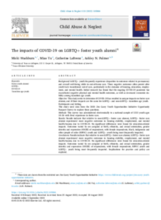Background
LGBTQ+ youth frequently experience disparities in outcomes related to permanency and overall well-being while in out-of-home care. These negative outcomes often persist after youth have transitioned out of care, particularly in the domains of housing, education, employment, and mental health. Initial research has found that the ongoing COVID-19 pandemic has exacerbated negative physical and mental health outcomes, as well as decreased economic stability among transition age youth.
Objective
This study seeks to determine if COVID-19 has resulted in unique impacts on foster care alumni, and if these impacts are the same for LGBTQ+ and non-LGBTQ+ transition age youth.
Participants and Setting.
This study used data from the 2020 Jim Casey Youth Opportunities Initiative Opportunity Passport Survey to explore these questions.
Methods
This survey was administered electronically to a national sample of 1223 youth ages 18–26 with lived experience in foster care.
Results
Results indicate that relative to non-LGBTQ+ foster care alumni, LGBTQ+ foster care alumni experienced more negative outcomes in housing stability, employment, and mental health/trauma due to COVID-19. No significant differences were found for education-related impacts. Outcomes varied by sex assigned at birth, ethnicity, and sexual orientation, gender identity and expression (SOGIE) of respondents, with female respondents, black, indigenous and other people of color (BIPOC) youth and LGBTQ+ youth being most frequently impacted.
Conclusions
Results indicate that relative to non-LGBTQ+ foster care alumni, LGBTQ+ foster care alumni experienced more negative outcomes in housing stability, employment, and mental health/trauma due to COVID-19. No significant differences were found for education-related impacts. Outcomes varied by sex assigned at birth, ethnicity, and sexual orientation, gender identity and expression (SOGIE) of respondents, with female respondents, BIPOC youth and LGBTQ+ youth being most frequently impacted. Implications for practice and policy are explored.

